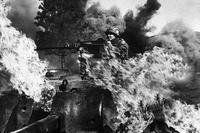German novelist Norman Ohler hears a story from a Berlin DJ friend Alexander Kramer: old WWII veterans have told tales of being out of their minds on drugs during combat. Kramer asks, "Do you know the massive role drugs played in National Socialism?" Ohler sets off to investigate and the result is "Blitzed: Drugs in the Third Reich," a compelling piece of serious scholarship that offers a comprehensive view of drugs in Nazi Germany that professional historians seem to have missed.
Ohler has two basic points: the fearsome Nazi fighting machine at the beginning of the war was fueled by methamphetamine and that Hitler's own rising drug abuse prevented him from making decisions that could have ended the war sooner.

In the 1930s, the German pharmaceutical firm Temmler developed Pervitin, a prescription methamphetamine that was marketed as a confidence booster and overall pep pill. The drug even found its way into candy marketed to housewives ("Hildebrand chocolates are always a delight"). The military quickly realized that Pervitin could help its troops fight sleep and the drug fueled the 1940 Blitzkrieg that shocked the world. If Hitler allowed his generals to properly attack Dunkirk, the war could've been over.
Anyone who's had the misfortune to spend time around meth users knows that diminishing returns quickly becomes an issue. The longer the war dragged on, the less effective it became and the more addicted the troops became. Ohler is a German writing about his own history, so he doesn't compare the Germany's drug use to the British military's reliance on amphetamines during the same era. A side-by-side analysis might conclude that the Brits were a bit more controlled in their drug deployment, but that's not a topic that Ohler is investigating here.

Ohler makes extensive use of Dr. Theodor Morell's files after he visited archives all over the world to reassemble the doctor's weapons. Morell was Hitler's personal physician and the Führer's close personal confidant. As stress built during the war, Morell started mixing Pervitin, cocaine and slaughterhouse byproducts into the leader's vitamin shots. By the end of the war, the vegetarian leader who had decried drug users as "criminally insane" was so doped up that he didn't have a grip on reality.
The author has also worked as a journalist, so he's written a book that's easy to read even though Ohler's meticulous about his sources. There are plenty of photos that give context to the tale.
The real story here isn't that the German military used drugs as performance enhancers during battle, since militaries have been looking for ways to amp up the troops as long as there's been war. The revelation is just how reckless the German medical community was with an untested drug. The fact that the drug was methamphetamine makes the story all the more terrifying.






